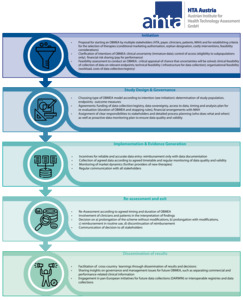Wohlhöfner, K. (2021): (Good) practice organisational models using real-world evidence for public funding of high prized therapies. HTA-Projektbericht 138.
Preview |
PDF (HTA-Projektbericht_Nr.138)
- Sie müssen einen PDF-Viewer auf Ihrem PC installiert haben wie z. B. GSview, Xpdf oder Adobe Acrobat Reader
11MB |
![[thumbnail of Addendum: Infografik OBMEAs]](https://eprints.aihta.at/1329/13.hassmallThumbnailVersion/Abbildung2_Englisch_FINAL.png)  Preview |
PDF (Addendum: Infografik OBMEAs)
- Sie müssen einen PDF-Viewer auf Ihrem PC installiert haben wie z. B. GSview, Xpdf oder Adobe Acrobat Reader
1MB |
The growing market entry of high-cost medicines threatens the financial sustainability of healthcare systems. The limited availability of data on the benefit of therapies at the time of approval poses a challenge for payers. Outcome-based Managed-entry agreements (OBMEAs) present a reimbursement tool for payers to fund therapies and enable patient access - under certain conditions. At the same time, new evidence on the effect of treatments in routine practice is collected, which allows the reassessment of therapies at a later point in time. However, data management and ownership often lie with the marketing authorisation holder, which limits information exchange across countries and mutual learning.
Objective: Therefore, the study aimed to design a generic organisational model for OBMEAs for highly-priced therapies, providing conditional funding while simultaneously generating publicly accessible data on the real-world evidence of treatment effects.
Methods: A systematic literature search was conducted to identify role models for the organisation of OBMEAs in different countries, followed by eleven semi-structured expert interviews to learn about their experiences made under these schemes.
Results: Overall, 16 frameworks were identified, four generic and twelve country-specific models. Their modular design varied considerably across countries due to ,e.g., the different stages of development and implementation of OBMEAs. Therapeutic areas often targeted were oncological and rare diseases, with gene- and CAR-T cell therapies among the most frequently mentioned. Countries reported mixed experiences with OBMEAs, highlighting the burden of data collection and issues with data quality. Following that, recommendations made were to carefully pre-specify data collection, use existing data infrastructure systems, and increase stakeholder engagement and public transparency.
Conclusion: In theory, OBMEAs present an alternative pricing approach by sharing risks equally between private and public entities. Yet, an imbalance is caused by the lack of transparency around these agreements, hindering the successful implementation in practice. Therefore, a higher level of standardisation could generate more comparable results and facilitate cross border information sharing. Existing collaboration initiatives provide a good starting point to achieve public value.
| Item Type: | Project Report |
|---|---|
| Keywords: | Managed-Entry-Agreements (MEA), conditional coverage, high-priced medicines, high-priced therapies, gene therapy, Advanced Therapy Medicinal Products (ATMP) |
| Subjects: | QZ Pathology > QZ 50 Medical genetics W Health professions > W 74-80 Medical economics. Health care costs W Health professions > W 84 Health services. Quality of health care W Health professions > W 100-275 Medical, dental and pharmaceutical service plans WA Public health > WA 525-590 Health administration and organisation WB Practice of medicine > WB 60 Bioethics. Clinical ethics. Clinical ethics committees WB Practice of medicine > WB 102 Evidence-based medicine WB Practice of medicine > WB 300-962 Therapeutics WB Practice of medicine > WB 340-356 Drug Administration X Information sciences |
| Language: | English |
| Series Name: | HTA-Projektbericht 138 |
| Deposited on: | 12 Jul 2021 13:20 |
| Last Modified: | 20 Jul 2021 11:35 |
Repository Staff Only: item control page
